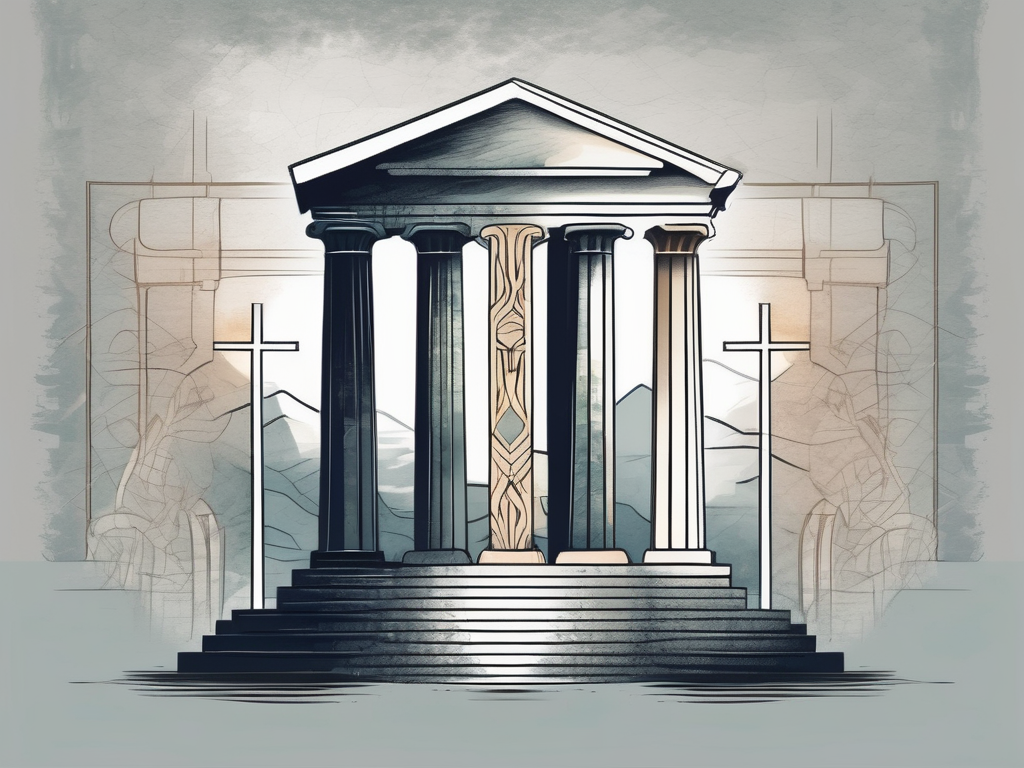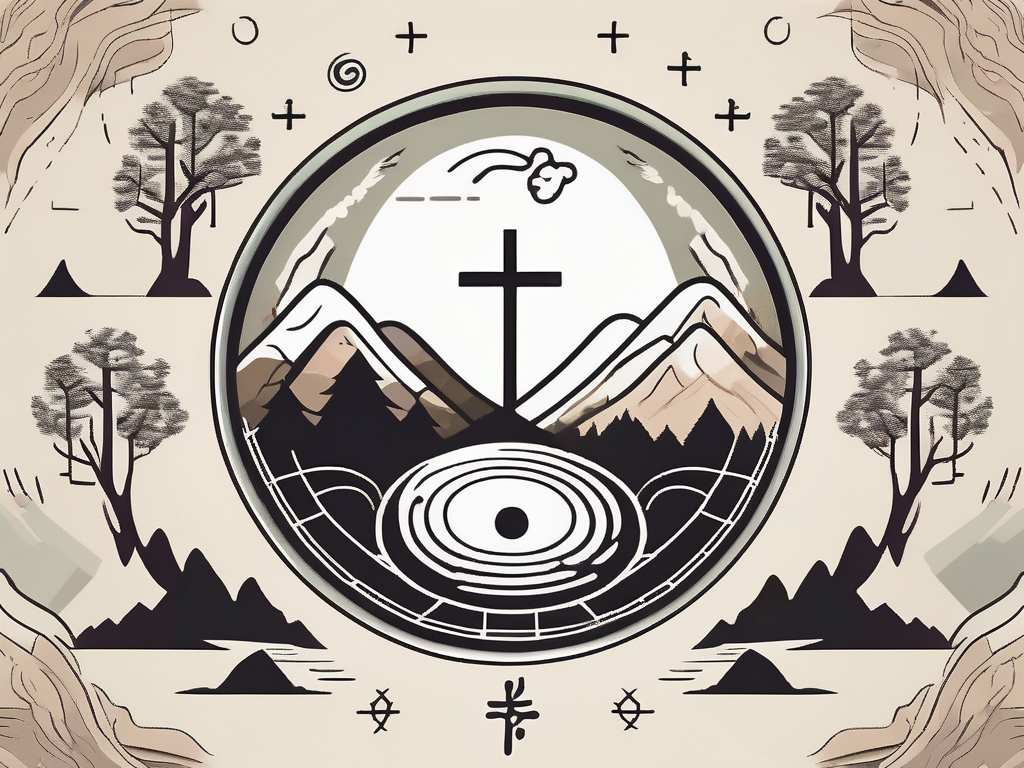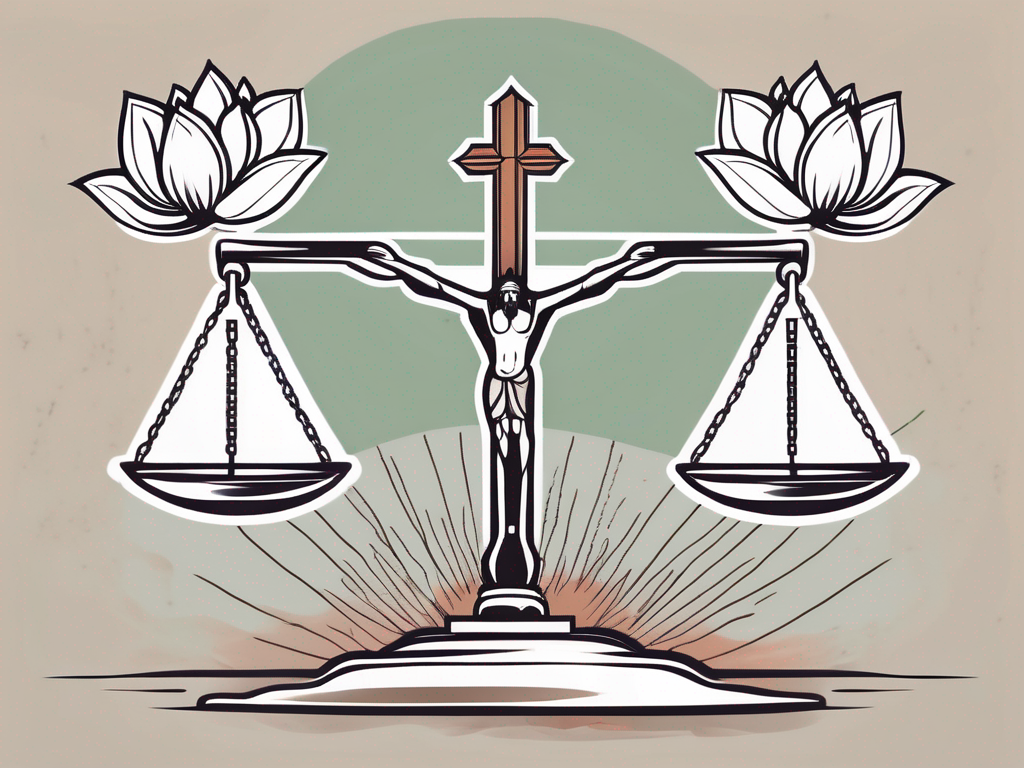In our diverse world, different belief systems shape the way people understand the universe and their place in it. This article aims to explore two prominent belief systems: Christianity and Greek Mythology. By understanding their origins, core beliefs, deities, and rituals, we can gain insights into the ways they have influenced societies throughout history.
Understanding Belief Systems
Before diving into the specifics, it’s crucial to establish what we mean by belief systems. Essentially, a belief system is a set of principles and values that guide individuals’ understanding of the world, their purpose, and their moral code.
Belief systems play a fundamental role in shaping human societies and cultures. They provide a framework for individuals to make sense of the world around them, offering explanations for the mysteries of life and providing a sense of purpose and meaning. These systems can vary greatly, ranging from religious beliefs to philosophical ideologies to cultural traditions.
Within belief systems, there are often various branches and interpretations. These differences can lead to diverse practices and rituals, as well as debates and discussions among followers. The complexity and diversity of belief systems contribute to the richness of human history and culture.
Defining Christianity
Christianity is a monotheistic religion centered on the life and teachings of Jesus Christ. It emerged in the 1st century AD and has since become one of the world’s most widespread religions. Christians believe in God as the creator of the universe and Jesus as the Son of God, sent to save humanity.
Christianity has a rich history and has evolved over time, resulting in various denominations and sects. These different branches of Christianity have their own unique practices, interpretations of scripture, and traditions. From the Roman Catholic Church to Protestant denominations such as Lutheranism, Methodism, and Baptist, each branch brings its own distinct flavor to the faith.
Christianity has had a profound impact on art, literature, music, and architecture throughout history. From the magnificent cathedrals of Europe to the works of Renaissance masters like Michelangelo and Leonardo da Vinci, the influence of Christianity can be seen in countless cultural expressions.
Defining Greek Mythology
Greek Mythology, on the other hand, is a polytheistic belief system rooted in ancient Greek culture. It consists of a vast collection of myths and legends that explain natural phenomena, human experiences, and the actions of gods and heroes.
Ancient Greeks believed in a pantheon of gods and goddesses, each with their own unique powers and personalities. These deities were worshipped and revered, with temples and rituals dedicated to their honor. Greek mythology provided explanations for the creation of the world, the origins of humanity, and the forces of nature.
Greek mythology has had a lasting impact on Western culture. Its stories and characters have been retold and reimagined in countless works of literature, art, and film. From the heroic tales of Achilles and Odysseus in Homer’s “Iliad” and “Odyssey” to the tragic love story of Orpheus and Eurydice, these myths continue to captivate and inspire audiences today.
Furthermore, Greek mythology has influenced the language we use. Many words and phrases in the English language have their origins in Greek mythology, such as the word “narcissism” derived from the story of Narcissus or the term “Pandora’s box” representing a source of unexpected troubles.
Origins and Historical Context
Understanding the historical context in which these beliefs developed is crucial for grasping their significance.
The origins of Christianity can be traced back to the Middle East during the Roman Empire. It was during this time that Jesus’ teachings emerged, challenging the prevailing religious norms of the era. As his message spread, Christianity gained momentum and followers, ultimately leading to the establishment of the Church.
Meanwhile, Greek Mythology had its roots in ancient Greece. It emerged alongside the rise of city-states and their pantheon of gods. These myths provided explanations for natural disasters, societal customs, and human behavior. The Greeks believed that their gods controlled various aspects of life and worshipped them through rituals and sacrifices.
The Birth of Christianity
Christianity originated in the Middle East during the Roman Empire. Jesus’ teachings and the subsequent spread of Christianity challenged the prevailing religious norms, ultimately leading to the establishment of the Church. The teachings of Jesus emphasized love, compassion, and forgiveness, which resonated with many individuals seeking spiritual fulfillment.
As Christianity gained followers, it faced opposition from both the Roman authorities and other religious groups. The Roman Empire, known for its polytheistic beliefs, viewed Christianity as a threat to its power and stability. Christians were often persecuted and faced harsh consequences for their faith.
Despite the challenges, Christianity continued to grow, spreading beyond the borders of the Roman Empire. The early Christians formed communities and established churches, creating a network of believers who supported and nurtured the faith.
The Emergence of Greek Mythology
Greek Mythology’s roots can be traced back to ancient Greece, where it evolved alongside the rise of city-states and their pantheon of gods. These myths provided explanations for natural disasters, societal customs, and human behavior. The Greeks believed that their gods controlled various aspects of life and worshipped them through rituals and sacrifices.
The Greek gods and goddesses were depicted with human-like qualities and emotions, making them relatable to the people. They had their own personalities, strengths, and weaknesses, which often mirrored the characteristics of humans. The myths surrounding these gods and goddesses served as a way to understand the world and human experiences.
Over time, Greek Mythology became an integral part of Greek culture, influencing various aspects of society, including art, literature, and philosophy. The stories of gods and heroes were passed down through generations, shaping the collective imagination of the Greek people.
Core Beliefs and Principles
The beliefs and principles that religious adherents hold dear play an essential role in defining the belief systems. These core beliefs serve as the foundation upon which the entire religious framework is built, shaping the worldview and guiding the actions of its followers.
Within the realm of religious belief, there exists a vast array of diverse and intricate systems, each with its own unique set of core principles. These principles often serve as a moral compass, providing guidance on how to live a virtuous and meaningful life.
One such belief system is Christianity, which has a rich and complex set of fundamental teachings. Christianity revolves around teachings such as the existence of one God, the divinity of Jesus Christ, the afterlife, and the importance of love, forgiveness, and compassion. These teachings form the bedrock of Christian faith, providing believers with a sense of purpose and direction in their spiritual journey.
Christianity, with its emphasis on monotheism, asserts the existence of a single supreme being who is all-knowing, all-powerful, and all-loving. This belief in the divine unity of God serves as the cornerstone of Christian theology, shaping the understanding of the nature of God and the relationship between God and humanity.
Furthermore, the divinity of Jesus Christ is a central tenet of Christianity. Christians believe that Jesus is the Son of God who took on human form to redeem humanity from sin and offer salvation. This belief in the divinity of Jesus is a source of hope and inspiration for Christians, as it signifies God’s love and willingness to sacrifice for the sake of humanity.
Another important aspect of Christian belief is the concept of the afterlife. Christians hold the belief in the existence of heaven and hell, where individuals will be rewarded or punished based on their actions in life. This belief in the afterlife provides believers with comfort and reassurance, knowing that their earthly struggles and hardships are not in vain but will be ultimately rewarded or reconciled in the eternal realm.
Love, forgiveness, and compassion are central virtues in Christianity. Jesus taught his followers to love one another unconditionally, to forgive those who have wronged them, and to show compassion to the marginalized and oppressed. These principles guide Christians in their interactions with others, promoting harmony, empathy, and social justice.
Fundamental Teachings of Christianity
Christianity, with its rich history and diverse denominations, encompasses a wide range of beliefs and practices. While the core principles mentioned above form the foundation of Christian faith, there are numerous other teachings and doctrines that shape the religious landscape.
For instance, the Bible, consisting of the Old and New Testaments, serves as the sacred text and primary source of authority for Christians. It contains a collection of writings that recount the history, teachings, and prophecies of the faith. Christians hold the belief that the Bible is divinely inspired and serves as a guide for moral and spiritual living.
In addition to the Bible, Christian theology is shaped by the teachings of prominent figures such as the early Church fathers, theologians, and philosophers. These influential thinkers have contributed to the development of Christian doctrine, helping believers deepen their understanding of God, humanity, and the world.
Christian worship practices vary across different denominations, but they often involve communal gatherings, prayer, singing hymns, and the celebration of sacraments such as baptism and the Eucharist. These rituals serve as a means of connecting with the divine, fostering spiritual growth, and nurturing a sense of community among believers.
Furthermore, Christian ethics play a vital role in guiding the moral conduct of believers. The ethical teachings of Christianity emphasize virtues such as honesty, integrity, humility, and justice. Christians are called to live a life of righteousness, striving to emulate the example set by Jesus Christ.
Central Themes in Greek Mythology
Greek Mythology, with its captivating tales of gods, heroes, and mythical creatures, has fascinated people for centuries. These ancient stories are not merely entertaining narratives but also serve as a reflection of the values, beliefs, and cultural identity of the ancient Greeks.
Central themes within Greek Mythology encompass a wide range of concepts and ideas. One of the recurring themes is the power struggles between gods. The Greek pantheon is filled with deities who possess distinct personalities, powers, and domains. These gods often engage in conflicts and rivalries, vying for supremacy and control over various aspects of the mortal world. These power struggles serve as a metaphor for the complex dynamics of human relationships and the pursuit of power.
Another prominent theme in Greek Mythology is the quests and adventures of heroes. These heroes, such as Heracles, Perseus, and Odysseus, embark on epic journeys and face numerous challenges and obstacles. These quests often involve encounters with mythical creatures, battles against formidable foes, and tests of character and courage. These heroic tales serve as a source of inspiration, highlighting the virtues of bravery, perseverance, and heroism.
Human hubris, or excessive pride, is a recurring theme in Greek Mythology. The gods often punish mortals who display arrogance and disrespect towards the divine. These stories serve as cautionary tales, warning against the dangers of excessive pride and the consequences that follow such hubris. They remind individuals of the importance of humility and reverence in their interactions with the gods and the natural order of the world.
Furthermore, Greek Mythology is replete with various supernatural creatures, ranging from fearsome monsters to enchanting nymphs. These creatures add depth and intrigue to the mythological narratives, representing the mysterious and awe-inspiring aspects of the natural world. They embody the forces of nature, the wonders of the cosmos, and the mysteries of life and death.
Overall, Greek Mythology provides a rich tapestry of stories and symbols that continue to captivate and inspire people to this day. These myths offer insights into the human condition, exploring universal themes such as love, betrayal, heroism, and the pursuit of knowledge. They serve as a testament to the enduring power of storytelling and the human desire to make sense of the world through myth and legend.
Deities and Supernatural Beings
Exploring the deities and supernatural beings in both belief systems provides insights into their cultural and moral norms.
The Christian God and the Holy Trinity
Within Christianity, God is considered the creator and sustainer of all existence. Additionally, the concept of the Holy Trinity highlights the threefold nature of God: the Father, the Son (Jesus), and the Holy Spirit.
The Pantheon of Greek Gods and Goddesses
Greek Mythology boasts an extensive pantheon filled with gods and goddesses, each with their unique attributes and spheres of influence. Examples include Zeus, the king of the gods, and Athena, the goddess of wisdom and warfare.
Rituals, Practices, and Traditions
Rituals and practices allow adherents to communicate with the divine, strengthen their faith, and uphold cultural traditions.
Christian Worship and Sacraments
Christian worship often takes place in churches and may include practices such as prayer, singing hymns, and celebrating the sacraments, like baptism and the Eucharist (communion).
Greek Mythological Ceremonies and Festivals
In ancient Greece, religious ceremonies and festivals were held to honor the gods. These events involved rituals, processions, sacrifices, and performances, all of which united communities and reinforced their connection with the divine.
By comprehending the foundations, beliefs, deities, and rituals of both Christianity and Greek Mythology, we gain a deeper understanding of how these belief systems have shaped individuals and societies throughout history. Each provides unique insights and contributions to the world of human spirituality, morality, and cultural heritage. Understanding the similarities and differences between these belief systems invites us to appreciate the rich tapestry of human thought and the diverse ways we seek meaning in the world.












